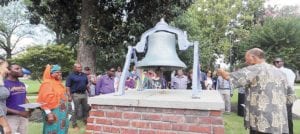It was 400 years ago when the first Africans arrived in Jamestown, Va., marking the beginning of institutionalized slavery.
To commemorate this historical moment locally, the Memphis Branch of the Association for the Study of African-American Life and History gathered at LeMoyne-Owen College on Monday (Aug. 19) to reflect on the journey of their ancestors.
“It is important for us to know when these 20 odd Negroes arrived, the U.S. was not a nation, but it was the initial steps to slavery,” said Clarence Christian, president of ASALH Memphis.
ASALH, established in 1915 by Carter G. Woodson to promote and disseminate information about black life, history and culture to the global community, is hosting events throughout the country to “educate America about the arrival of Africans in the Virginia colony and tell the story of the resilience of the African-American family, their contributions to America and African American perseverance through trials and triumphs.”
“The commemoration forces us to shed light on slavery – an institution that has been ignored and denied,” said Christian.
The gathering of LeMoyne-Owen students, faculty members, alumni and community supporters near the Amistad Bell was strategic.

According to Christian, the bell was an integral part of Lincoln Chapel – the original name of LeMoyne-Owen – and was rung when something was happening on campus. ASALH Memphis chose this location because Lemoyne-Owen is the oldest piece of history in Memphis connected to the African-American experience.
Dr. Earnestine Jenkins, a University of Memphis professor and facilitator for the event, expressed the importance and significance of the year 1619.
“Slavery was officially instituted in Virginia, Maryland and Carolina colonies in 1640. By 1650, there were 300 slaves in the Virginia colony. By 1700, slavery was endemic to the South. Africans had the legal status of slaves for their entire life.
“Descendants of Africans or blacks who were now being born in the colonies were born into slavery and inherited slave status based on the mother, irrespective of who the father might be. Following those 20 odd Negroes, over 12.5 million peoples from West and Central Africa were forced into the Atlantic Slave Trade between 1501 and 1867. It is estimated that only 10.7 million survived the Middle Passage. It is estimated that just as many did not.”
As part of the event, LeMoyne-Owen’s Mr. and Miss LOC and other individuals were asked to ring the bell as a symbol of something happening, just like in the past when it was rang during the Lincoln Chapel days.
ASALH Memphis will host its next 400th commemoration event – a panel discussion on “400 Years of Perseverance Honoring the Ancestors and 400 Years of African American Resilience” – on Aug. 27 at 6 p.m. at the Withers Collection Museum located at 333 Beale Street.
(To learn more about ASALH, contact Clarence Christian at cchristian1934@gmail.com. Paula Anderson is a freelance journalist. She can be reached at writingbydesign7@gmail.com.)


